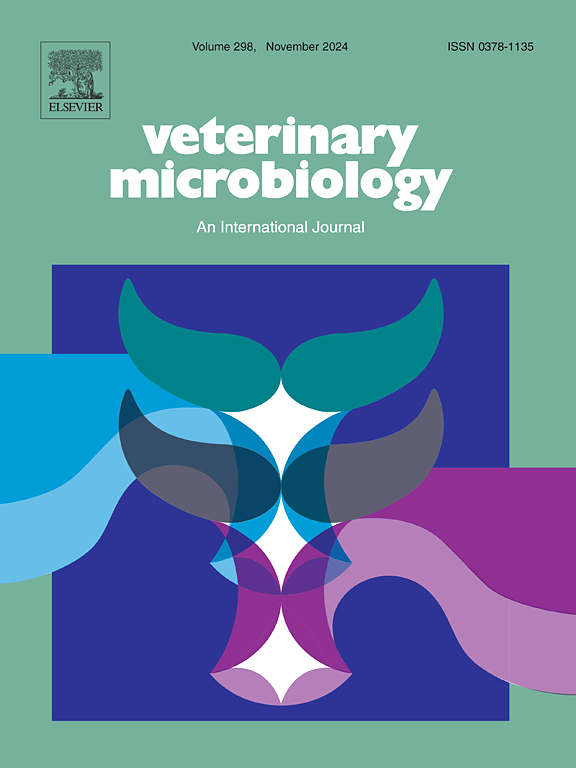抗生素引起的肠道菌群失调增加了FAdV-4的易感性并改变了鸡的抗病毒免疫
IF 2.7
2区 农林科学
Q3 MICROBIOLOGY
引用次数: 0
摘要
免疫调节受肠道微生物群落的显著影响。例如,肠道共生体产生的短链脂肪酸(SCFAs)是有益的免疫调节剂。抗生素广泛应用于家禽业,以提高饲料效率和预防疾病;然而,这种治疗策略破坏了正常菌群,但它们如何影响对肠道病原体的耐药性尚不清楚。禽腺病毒是引起雏鸡急性和严重炎症的主要传染因子。本研究探讨了抗生素给药对血清4型禽腺病毒(FAdV-4)感染期间微生物组成和免疫反应的影响。口服混合抗生素可增加对FAdV-4的易感性。在口服抗生素和感染FAdV-4的鸡中,活化的髓样细胞减少,促炎免疫分子增加。此外,微生物群的均匀性和厚壁菌门与拟杆菌门的比例被改变,导致产生scfa的微生物受到抑制。这些发现为在依赖抗生素的家禽业中制定预防传染病的策略提供了有价值的免疫学见解。本文章由计算机程序翻译,如有差异,请以英文原文为准。
Gut microbiota dysbiosis by antibiotics increases FAdV-4 susceptibility and alters antiviral immunity in chickens
Immune regulation is significantly affected by gut microbial community. For example, short chain fatty acids (SCFAs), produced by gut symbionts, function as beneficial immune regulators. Antibiotics are widely used in the poultry industry to improve feed efficiency and prevent diseases; however, this treatment strategy disrupts the normal flora but how they might impact on resistance to enteric pathogen is not known. Fowl adenovirus is a major infectious agent that causes acute and severe inflammation in young chickens. This study investigates the impact of antibiotic administration on microbial composition and immune responses during serotype 4 fowl adenovirus (FAdV-4) infection. Oral administration of an antibiotic cocktail increased susceptibility to FAdV-4 challenge. In oral antibiotics administered and FAdV-4 affected chickens, there was a reduction in activated myeloid cells and an increase in pro-inflammatory immune molecules. Additionally, the microbiota evenness and the Firmicutes-to -Bacteroidetes ratio were altered, leading to the suppression of SCFA-producing microbes. These findings provide valuable immunological insights into developing preventive strategies against contagious diseases in the antibiotics-dependent poultry industry.
求助全文
通过发布文献求助,成功后即可免费获取论文全文。
去求助
来源期刊

Veterinary microbiology
农林科学-兽医学
CiteScore
5.90
自引率
6.10%
发文量
221
审稿时长
52 days
期刊介绍:
Veterinary Microbiology is concerned with microbial (bacterial, fungal, viral) diseases of domesticated vertebrate animals (livestock, companion animals, fur-bearing animals, game, poultry, fish) that supply food, other useful products or companionship. In addition, Microbial diseases of wild animals living in captivity, or as members of the feral fauna will also be considered if the infections are of interest because of their interrelation with humans (zoonoses) and/or domestic animals. Studies of antimicrobial resistance are also included, provided that the results represent a substantial advance in knowledge. Authors are strongly encouraged to read - prior to submission - the Editorials (''Scope or cope'' and ''Scope or cope II'') published previously in the journal. The Editors reserve the right to suggest submission to another journal for those papers which they feel would be more appropriate for consideration by that journal.
Original research papers of high quality and novelty on aspects of control, host response, molecular biology, pathogenesis, prevention, and treatment of microbial diseases of animals are published. Papers dealing primarily with immunology, epidemiology, molecular biology and antiviral or microbial agents will only be considered if they demonstrate a clear impact on a disease. Papers focusing solely on diagnostic techniques (such as another PCR protocol or ELISA) will not be published - focus should be on a microorganism and not on a particular technique. Papers only reporting microbial sequences, transcriptomics data, or proteomics data will not be considered unless the results represent a substantial advance in knowledge.
Drug trial papers will be considered if they have general application or significance. Papers on the identification of microorganisms will also be considered, but detailed taxonomic studies do not fall within the scope of the journal. Case reports will not be published, unless they have general application or contain novel aspects. Papers of geographically limited interest, which repeat what had been established elsewhere will not be considered. The readership of the journal is global.
 求助内容:
求助内容: 应助结果提醒方式:
应助结果提醒方式:


